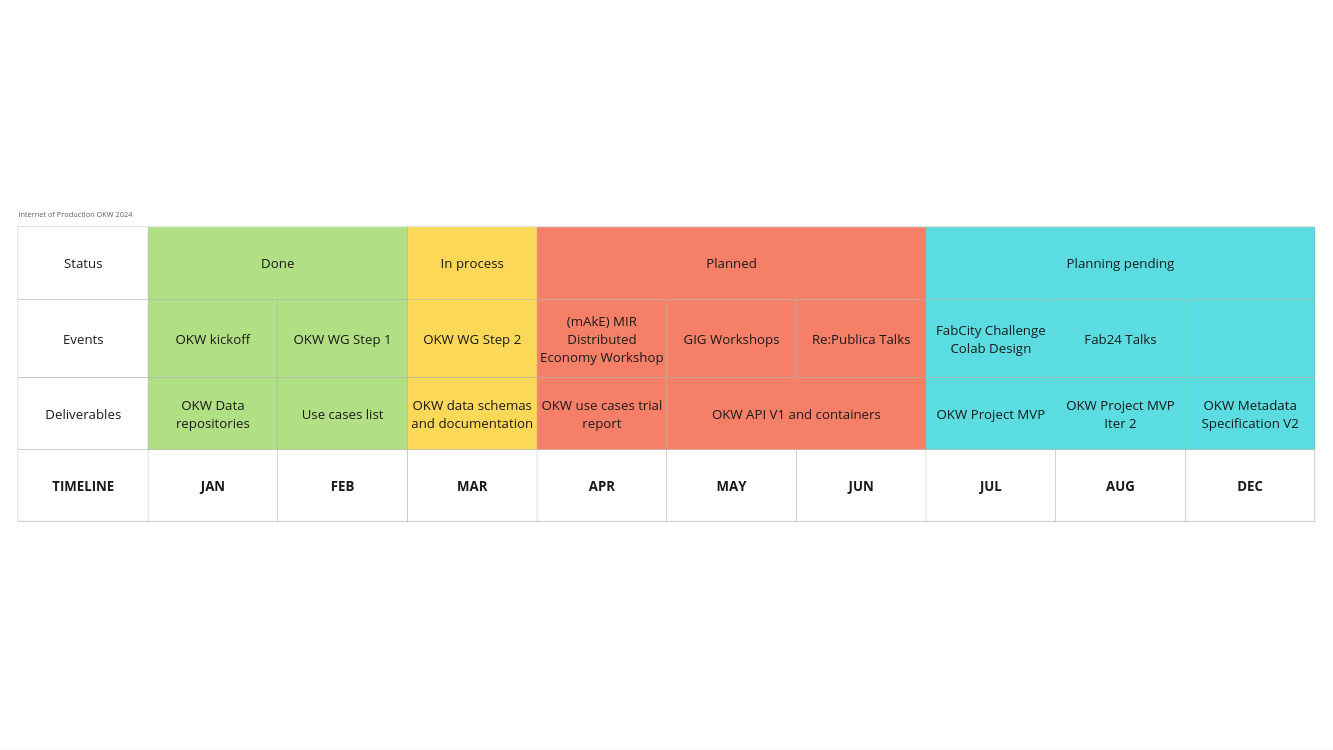WORKING GROUP
Working Group Sessions for the Open-Know-Where (OKW) Initiative
Overview
The Open-Know-Where (OKW) initiative is transitioning from creating Geo-location data reports to offering open databases, ETL aggregation, and manufacturing data validation specifications. The working group sessions play a crucial role in this transition, fostering collaboration, knowledge sharing, and strategic planning among participants.
Objectives
The primary objectives of the working group sessions are to:
- Facilitate Collaboration: Bring together diverse stakeholders from the global Distributed Manufacturing Ecosystem.
- Share Knowledge: Disseminate insights, methodologies, and best practices related to data collection, validation, and utilization.
- Strategize Development: Plan and coordinate the development of OKW tools and resources, including databases, APIs, and data visualization tools.
- Enhance Engagement: Engage the community in contributing to and utilizing OKW resources for economic development, disaster response, and manufacturing innovation.
Structure
The working group sessions are structured to ensure comprehensive coverage of key topics and effective engagement of participants. Each session typically includes:
- Introduction and Objectives: Overview of the session's goals and agenda.
- Presentations and Updates: Updates on the current state of the OKW initiative, including recent developments, data insights, and tool enhancements.
- Discussion and Feedback: Interactive discussions to gather feedback, address challenges, and explore new ideas.
- Action Planning: Identification of actionable items, assigning responsibilities, and setting timelines for implementation.
Key Topics
Working group sessions focus on a range of topics critical to the success of the OKW initiative, including:
- Data Collection and Validation:
- Best practices for data collection from various sources.
- Validation techniques to ensure data accuracy and reliability.
- Tool Development and Integration:
- Development of APIs and data visualization tools.
- Integration of OKW tools with existing platforms and workflows.
- Use Cases and Applications:
- Identification and development of use cases for distributed manufacturing, economic development, and humanitarian response.
- Success stories and lessons learned from implemented projects.
- Community Engagement and Collaboration:
- Strategies to engage the global community in contributing to and benefiting from OKW resources.
- Collaboration opportunities with partner organizations and initiatives.
Resources and Support
Participants in the working group sessions have access to a range of resources to support their contributions, including:
- OKW Data Collection Form: A tool to collect new data into the OKW database Link.
- OKW Machine Specifications Catalogue: A repository of identified machines and their specifications Link.
- OKW Data Science Notebooks: Documentation and tools for data transparency and reproducibility Link.
- OKW Map Data Representation Prototype: Visualization of collected data and its guidelines Link.
Members
The working group sessions involve a diverse set of members who contribute their expertise and perspectives to the OKW initiative. Key members include:
Researchers and Data Scientists:
- Experts in data collection, analysis, and validation.
- Contributors to the development of data science notebooks and methodologies.
Distributed Manufacturing Practitioners:
- Representatives from maker-spaces, fab-labs, and distributed manufacturing networks.
- Providers of practical insights and use case examples.
Community Organisers and Economic Developers:
- Individuals focused on leveraging distributed manufacturing for local economic development.
- Advocates for community engagement and capacity building.
Policy Makers and Humanitarian Response Coordinators:
- Stakeholders interested in using OKW resources for disaster response and humanitarian aid.
- Contributors to policy development and implementation strategies.
Plan

Participation
The working group sessions are open to all stakeholders interested in contributing to the OKW initiative. Participants can join by contacting the OKW initiative through their communication channels or by visiting their GitHub repositories for more details on ongoing projects and how to get involved.
By actively participating in the working group sessions, stakeholders can help shape the future of distributed manufacturing, drive economic growth, and improve disaster response capabilities globally.
